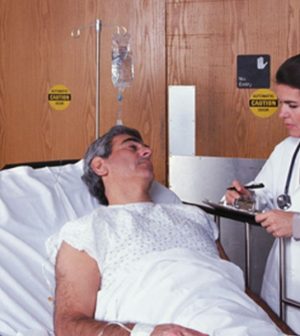- Could Your Grocery Store Meat Be Causing Recurring UTIs?
- Are You Making This Expensive Thermostat Error This Winter?
- Recognizing the Signs of Hypothyroidism
- 10 Strategies to Overcome Insomnia
- Could Artificial Sweeteners Be Aging the Brain Faster?
- Techniques for Soothing Your Nervous System
- Does the Water in Your House Smell Funny? Here’s Why
- Can a Daily Dose of Apple Cider Vinegar Actually Aid Weight Loss?
- 6 Health Beverages That Can Actually Spike Your Blood Sugar
- Treatment Options for Social Anxiety Disorder
Overcrowded ERs Risky for Some Seriously Ill Patients

People with the potentially life-threatening infection complication known as sepsis are less likely to receive immediate antibiotic treatment in overcrowded emergency departments, researchers say.
“Prompt initiation of appropriate antibiotics is the cornerstone of high-quality sepsis care, a fact emphasized in Medicare quality measures and international guidelines,” said the study’s lead author, Dr. Ithan Peltan. He is a physician at the Intermountain Medical Center and University of Utah School of Medicine.
Each one-hour delay in receiving antibiotics is associated with as much as a 10 percent increase in the risk of death from sepsis, Peltan pointed out in a news release from the American Thoracic Society.
The study looked at 945 sepsis patients at emergency departments of four hospitals in Utah. The patients were seen between July 2013 and December 2015.
Antibiotics were given within the recommended 3-hour window to 83 percent of patients in an uncrowded ER. However, in a crowded ER, just 72 percent were given timely antibiotics, the investigators found.
People in a crowded ER waited about 47 minutes longer for antibiotics than those in an uncrowded ER, the findings showed.
“Our findings suggest adequate staff and diagnostic resources are critical to effective sepsis care. Hospitals should also consider sepsis care reorganization to bypass competing demands on clinicians and diagnostic resources,” Peltan said.
The study was scheduled to be presented Sunday at an American Thoracic Society meeting, in Washington, D.C. Studies presented at meetings are generally considered preliminary until they’ve been published in a peer-reviewed journal.
Many emergency departments have protocols that include pre-hospital notification and a rapid response team for conditions such as stroke, heart attack and trauma.
“I suspect similar protocols could improve timely care for sepsis,” Peltan said in the news release.
More information
The U.S. Centers for Disease Control and Prevention has more on sepsis.
Source: HealthDay
Copyright © 2026 HealthDay. All rights reserved.










